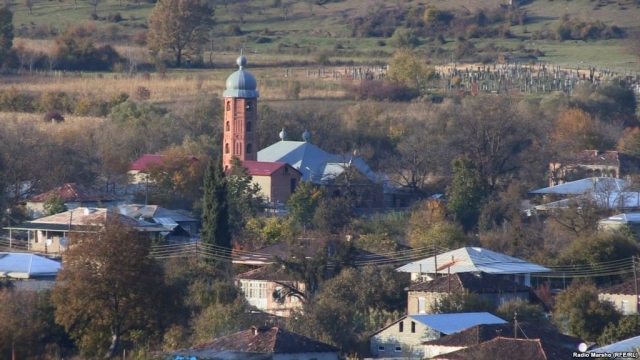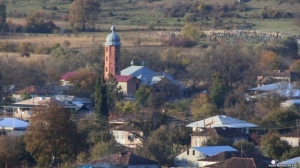Pankisi Imams Refuse to Recognize Child Marriages
TBILISI – The issue of child marriages has recently come to the attention of the Georgian government, who has been under increased scrutiny by civil society to halt the practice of marrying off mostly young girls to older men.
The issue is a nationwide problem and common in many of Georgia’s impoverished rural villages. The practice is particularly prominent in regions mostly inhabited by Muslim ethnic minorities.
In an important recent declaration, prominent Islamic religious leaders in Georgia’s Pankisi Gorge publicly refused to recognize the legitimacy of child marriages.
Located on the border between Georgia and Russia’s restive republic of Chechnya, the Pankisi Gorge has in recent years become known as the home of several prominent ISIS fighters. The most notable was Tarkhan Batirashvili, who gained international attention as the Islamic State’s top field commander under his Arabic nom de guerre, Abu Omar al-Shishani.
Shishani, whose name translates as “Omar the Chechen”, was recently mortally wounded in a massive US drone attack in northern Syria while meeting with several of his lieutenants in advance of a planned ISIS offensive.
Pankisi, where about 10,000 ethnic Chechens live in a scattering of isolated mountain villages in Georgia’s eastern Akhmeta district, has often been a stronghold of age-old mountain traditions that were historically associated with the Chechen clans, or teips.
After Russia waged two brutal wars to end Chechnya’s drive for independence in the 1990s, thousands of Chechen refugees were resettled in the Pankisi Gorge with their ethnic kin.
In complete violation of international law, Russia subsequently bombed the gorge on numerous occasions in the early 2000s, indiscriminately killing many civilians and refugees as it attempted to crush Chechnya’s rebel movement.
Since the chaos of the last decade, Pankisi’s residents have had little success in alleviating the rampant unemployment and poverty that plagues the region.
The bleak situation in the valley has led to a rise of radical Islamist movements among its younger population, particularly in the number of those who reject the Chechens’ traditional moderate form of Sufism in favor of an extremist brand of Saudi Arabian-style Salafism.
As fundamentalist Islamic teachings have gained traction among Pankisi’s youth, so have traditionally alien social mores, including child brides.
The shift away from the traditional Chechen brand of Sufism – seen by most in the population as paramount to their national identity – has caused a major rift with the community’s elders and religious leaders.
After several young Chechens turned up in Syria to emulate their local hero, Shishani, Pankisi’s elders began to push back.
On 24 March, Pankisi’s Council of Elders announced that child marriages will not be supported by the community’s imams or any of the traditional religious bodies operating out of the valley’s mosques.
“Imams from traditional (Sufi) mosques have decided that a girl younger than 18, who is still a student, should not be burdened with having her own family. This forces her to drop out of school. A girl must be able to finish her studies. Therefore, in accordance with Georgian law, child marriages will be banned,” council elder, Khaso Khangoshvili, told a local radio station.
The valley’s Salafists have hit back at the council, saying they will ignore the edict and continue to recognize child marriages.
Salafist imam Abdurrahman, born Vakhtang Pareulidze, slammed the council and accused them of insulting Islam. He went on to claim that only five per cent of the valley’s population follows the edicts of the Council of Elders, while the majority would obey the orders of the fundamentalist mullahs.
Abdurrahman later claimed in an interview that the council had no right to interpret Koranic traditions, which does not place an age limitation for a girl regarding a nikah, or religious marriage.
“For a religious marriage, one must satisfy three essential conditions: both parties and the bride’s father must agree; two men need to witness the ceremony and the groom’s family needs to pay a mahr, or dower, of 250 Gel (107 USD) to the bride’s family,” said Abdurrahman.
He later claimed that few of the community’s girls are forced to marry under the age of 16.
A 2014 study by the United Nations Population Fund (UNFPA) indicated that up to 17 per cent of Georgian women marry before their 18th birthday – one of Europe’s highest rates of underage marriage.
UNFPA Georgia Assistant Representative Lela Bakradze said the issue of child brides is a major concern for girls in Georgia, as it excludes them from having a social life and deprives them of basic rights, including an education.
“Pregnancy and childbirth during adolescence pose huge risks to a young girl’s health and her new-born baby. Ending the corrosive practice of child marriage is crucial to Georgian society. We must work with the communities and their adolescents to help change attitudes that force girls to be child brides,” Bakradze said.
By Tamar Svanidze
Edited by Nicholas Waller
Photo: Radio Marsho












